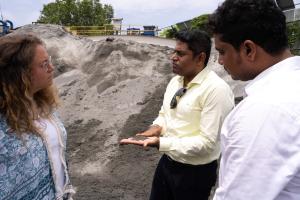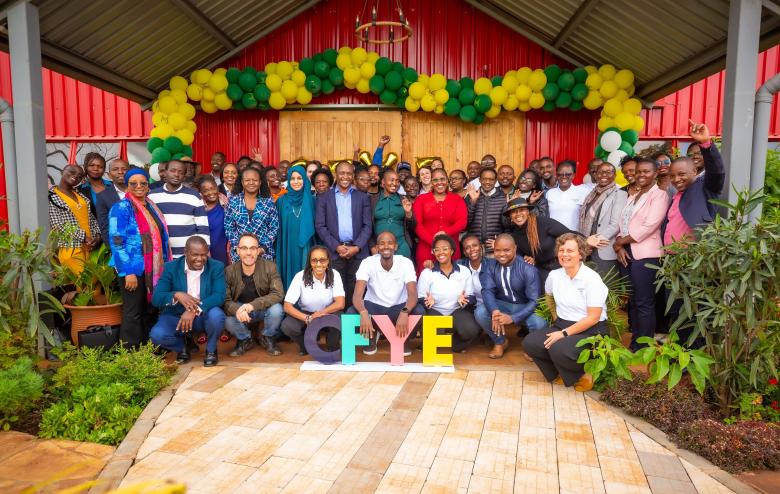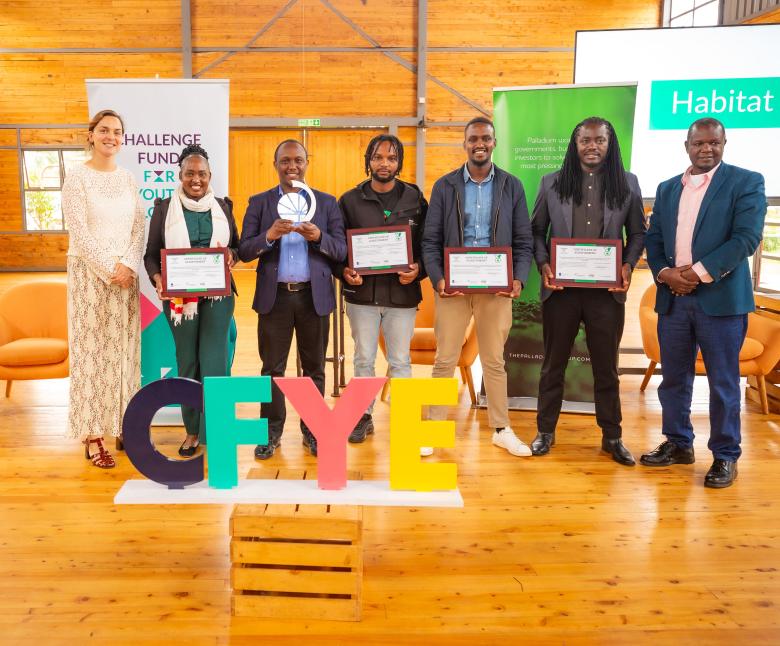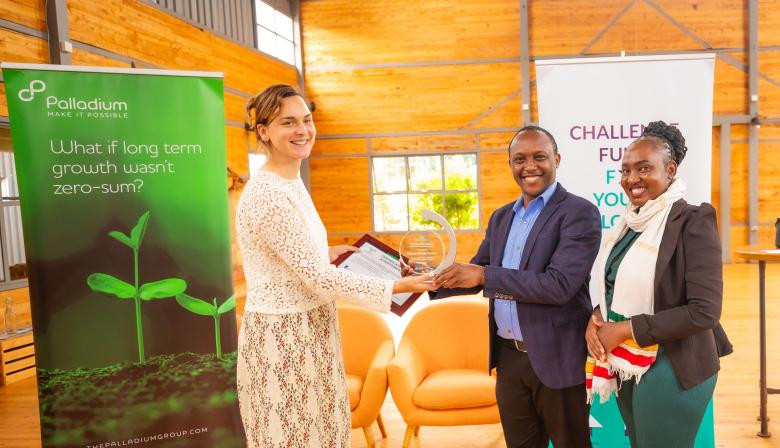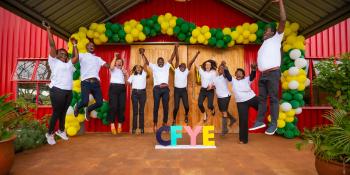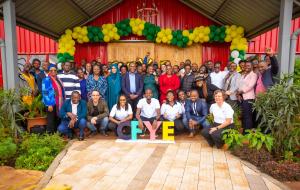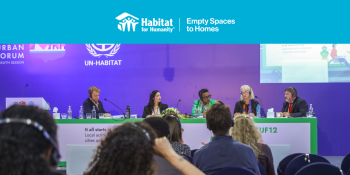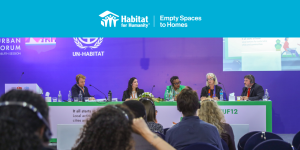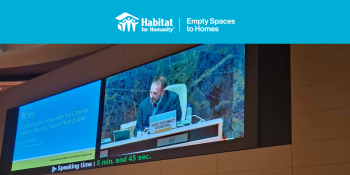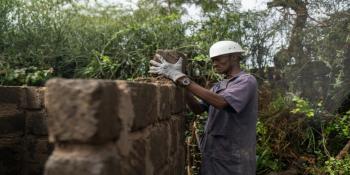How a Common Material Is Quietly Changing Construction in India
India’s rivers are paying the price for its construction boom, with illegal sand mining deepening riverbeds and worsening floods. But a quiet revolution is underway—driven by M-sand, a sustainable alternative backed by local innovators and supported by the Terwilliger Center for Innovation in Shelter (TCIS), an initiative led by Habitat for Humanity and supported by the Hilti Foundation. Together, they’re making it easier for families to build safe, affordable homes without harming the environment. With each new house built on M-sand, a more resilient and responsible future takes shape.
Mr. Chinnaiyan watches closely as his team of masons carefully lays bricks in place. The walls of a new home are rising steadily, just as they have in the 300+ houses he has built over the years. “I used to do all the work with my own hands,” he says. “Now, I guide my workers, making sure everything is done right. But the feeling is the same—building a home means building someone’s future.”
For over two decades, Chinnaiyan has worked in construction. He started as a helper, carrying bricks, mixing mortar, and learning the craft from older masons. Years of hard work turned him into a skilled mason, and eventually, he became a supervisor, leading a team of between dozens of workers.
His construction company, Aishwarya Constructions, is named after his daughter. “Initially, I named it SPA Constructions, but after she was born, I changed it,” he says. “She is my biggest inspiration.”
Through his company, he has helped countless families build homes, ensuring they have a strong foundation—both literally and figuratively.
The Changing Landscape of Construction
One of the biggest changes Chinnaiyan has seen in his career is the shift in building materials. Traditionally, river sand was the preferred choice for construction. “People believed it was the best, simply because it’s been used for generations,” he explains.
But sourcing river sand has become increasingly difficult. Illegal mining has stripped riverbeds, leading to environmental disasters like flooding, erosion, and destruction of natural habitats. Governments have tightened restrictions, and as a result, river sand prices have skyrocketed.
Alternatives were needed. Among these alternatives was manufactured sand, or M-sand, a material produced by crushing hard stones into fine aggregates that mimic the properties of river sand. Technically sound and environmentally sustainable, M-sand emerged as a promising option.
That’s where Aruna Blue Metals, a company founded by K. Senthil Kumar, stepped in. The company has been working to promote M-sand as a better alternative to river sand. “We saw the crisis coming,” says Senthil Kumar, CEO of Aruna Blue Metals.
When too much sand is taken from rivers, it weakens the river bed and erodes river banks and makes it harder for the ground to absorb water. Moreover, without enough sand, rivers can’t slow down water flow, leading to sudden and severe flooding especially during heavy rains.
In Tamil Nadu, excessive river sand mining has deepened riverbeds and damaged natural drainage systems, making floods worse. For example, the Thamirabarani and Palar rivers have experienced bed deepening by up to 15 meters over two decades due to extensive sand extraction. In 2015, Tamil Nadu experienced devastating floods that affected more than 4 million people and resulted in enormous economic loss.
These events underscore the critical need for sustainable alternatives like M-sand in construction to mitigate the adverse effects of sand mining and reduce the vulnerability of communities to flooding.
“We knew Tamil Nadu needed a sustainable, high-quality sand alternative, but breaking into the market and mainly direct customers wasn’t easy,” says Senthil Kumar, CEO of Aruna Blue Metals.
What was the biggest challenge of Aruna Blue Metals?
Convincing individual home builders and small contractors to switch.
Most of Aruna’s early success came from selling M-sand to large developers, but the real impact would come from reaching everyday people—the families building their own homes
That’s when the Terwilliger Center for Innovation in Shelter (TCIS), supported by Habitat for Humanity International and Hilti Foundation, stepped in. Their partnership with Aruna Blue Metals helped address key challenges in promoting M-sand, ensuring that more people had access to affordable and sustainable building materials.
Educating Masons and Contractors About the Quality and Benefits of M-Sand
Many workers in the construction industry, including masons and contractors, were skeptical about M-sand. They believed that river sand was superior simply because it had been used for generations.
Old habits die hard. “Many builders were reluctant to switch,” admits Mr. Chinnaiyan from his own experience from the ground. “Even when M-sand is cheaper and more consistent, people hesitated. They don’t trust what they don’t know.”
However, TCIS helped Aruna conduct training sessions, demonstrations, and outreach programs to change this perception. They worked with local masons, contractors, and engineers to explain how M-sand is produced, its consistency in quality, and its advantages over river sand.
These sessions reassured workers that M-sand was not just a cheaper alternative but a reliable and high-quality material for construction.
Expanding the Market Beyond Big Developers to Reach Individual Homeowners and Small-Scale Builders
Initially, Aruna’s primary customers were large developers who bought materials in bulk. However, the real impact of M-sand would be felt at the individual level—by families building their own homes and small contractors working on local projects.
TCIS supported Aruna in shifting its business model to cater to these customers. They helped establish distribution networks, connect with retailers who sold to individuals, and raise awareness among first-time home builders.
This expansion meant that even those building a single home could now access M-sand easily.
Streamlining Supply Chains to Make M-Sand More Available and Affordable in Local Markets
One of the key barriers to M-sand adoption was availability. Even when people wanted to switch, they often couldn’t find M-sand suppliers nearby.
TCIS worked with Aruna to improve logistics, ensuring M-sand reached more local markets at a competitive price. This included identifying new distribution hubs, reducing transportation costs, and improving the overall supply chain. As a result, M-sand became not only a sustainable alternative but also a more accessible and cost-effective option for everyday people.
Through these efforts, TCIS and Aruna were able to transform the construction landscape—helping masons like Chinnaiyan build more homes, giving families an affordable way to achieve homeownership, and reducing the environmental damage caused by river sand mining.
The results were truly transformative. “With TCIS’s support, our M-sand sales grew by 25% in just a few months. Before 2019, our business was primarily focused on selling to other businesses, with only 20% of our sales coming from individual customers. Today, that’s completely flipped—80% of our sales now come from individuals and smaller buyers, while only 20% comes from other businesses. This shift happened thanks to our partnership with TCIS,” says Senthil Kumar.
“More importantly, we saw a significant change in trust—homeowners, masons, and small contractors started choosing M-sand over traditional river sand which saves them precious money.”
A Sustainable Future for Housing
The acceptance of M-sand is about both affordability and sustainability. With fewer homes relying on river sand, the damage to India’s rivers can be slowed. “People don’t realize that every truckload of sand taken from a river is making future floods worse,” says Senthil Kumar. “Switching to M-sand doesn’t just save money—it protects our environment.”
With organizations like Hilti Foundation and TCIS championing innovation in shelter, the future of housing in India is changing. As M-sand becomes the norm, more families will be able to afford quality homes and India’s rivers will have a chance to recover.
Standing at the construction site, watching his workers put the final touches on a new home, Chinnaiyan smiles. “This house will stand for generations,” he says. “And that’s what matters.”
One home at a time, India is building towards a stronger, more sustainable future.
TCIS and the Hilti Foundation
The Hilti Foundation supports Habitat for Humanity’s Terwilliger Center for Innovation in Shelter (TCIS) to bring affordable, sustainable housing solutions to low-income families. Together, they work to develop and introduce practical, market-based products that can improve living conditions for underserved communities. Focusing on three pilot regions—Peru (construction services), India (heat-reflective coatings), and the Philippines (walls and foundations)—the initiative aims to prove that these solutions can succeed in real-world conditions. In India, for instance, the partnership is making strong progress, helping families access cooling roof coatings that reduce indoor temperatures and improve comfort in hot climates (read more on the initiative here) or build houses with the artificial sand that is both sustainable and more effective making safe and decent houses and home for affordable for people.
How a Common Material Is Quietly Changing Construction in India
A sustainable sand alternative is transforming housing—and helping reverse the environmental cost of construction.
